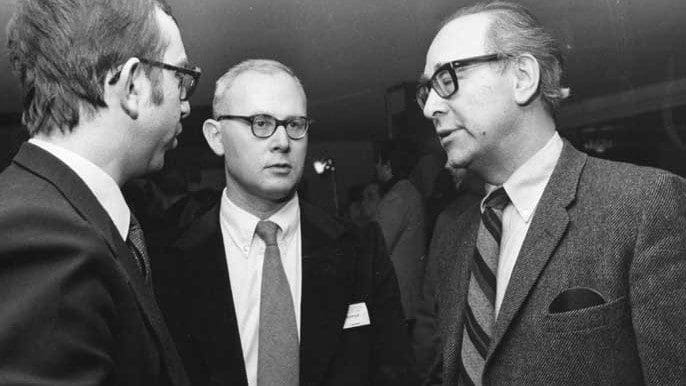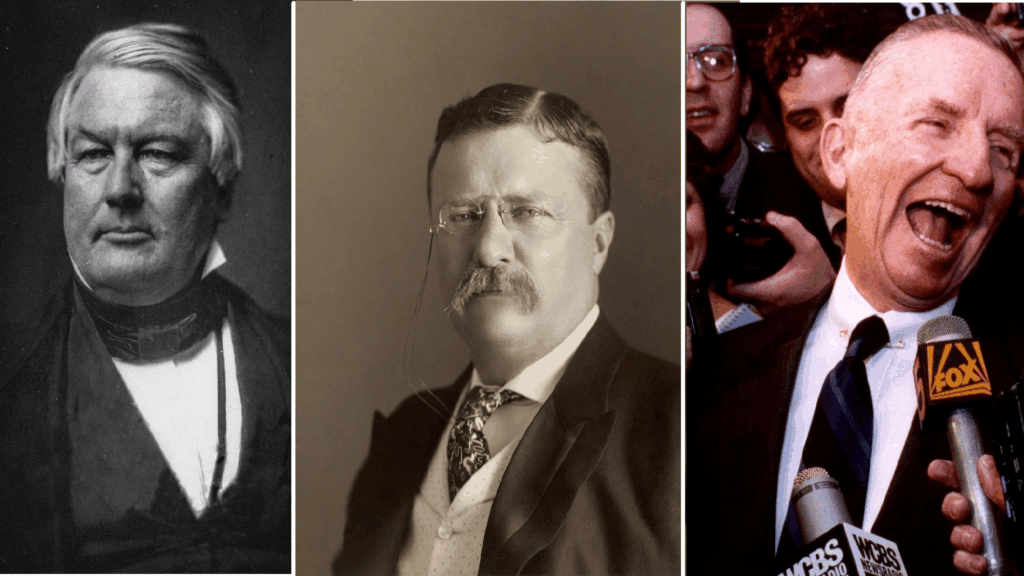The following is a translation of a review of Hungarian–American Catholic philosopher, historian, and political theorist Thomas Molnar’s book titled The Decline of the Intellectual written by Áron Czopf, originally published in the 2023/1 issue of Kommentár.
One of the aptest formulas of metapolitical thinking was described by German poet and writer Heinrich Heine, according to which ‘thought precedes action as lightning does thunder’. However, thunder never fails to come. Huddled under the eaves, we only have to count a few seconds between the flash and the roar—in contrast, history greatly extends this duration. Our waiting may even last for decades, while the silent flash that breaks through the spheres, i.e. the idea, speaks with a relentless voice and prompts us to fulfilment. In the midst of the storms of the 20th century, we saw the advanced intellectuals in the light of such a flash as they zigzagged through the darkness as Lightbringers at full strength of their Promethean vocation, just as fast as lightning.
The history of the intellectual type covers only a few decades,
so the history of its decline is also quite short, which would perhaps be even more appropriate to call a story of a decline as fast as lightning, as Hungarian American Catholic philosopher, historian, and political theorist Thomas Molnar (1921–2010) put it. Accordingly, the new Hungarian translation of his work titled The Decline of the Intellectual by Hungarian religious philosopher Balázs Mezei, first published in English in 1961, does not give an account of the twilight, deterioration, or decline of intellectuals. The title of the book does not refer to a kind of a twilight to dwell on, but a definite verdict. After the first flashes, we could only count a few decades and the 20th century was already gone.
Molnar also recalls French philosopher Julien Benda’s famous work titled The Treason of the Intellectuals, which defends the vocation of intellectuals against the national particularism of French authors and politicians Charles Maurras and Maurice Barrès, blind political commitment, and ‘irrationalism’ (in fact, we can read an involuntary parody of this in Hungarian philosopher and literary historian Georg Lukács’ classic of Western Marxism titled The Destruction of Reason). It has barely been a few decades since the political concept of intellectualism was born, mainly as a result of the opposition of French journalist Émile Zola and Barrès and their parties, and it is already as if the tangled body parts, the twisted embourgeoisement, and the showdown’s mercilessly ‘objective’ atmosphere of an Otto Dix painting surrounded us. We no longer have to talk only about intellectuals and counter-intellectuals or simply about the crisis of the modern normative concept of knowledge. Among the apocalyptic scenes of the 1920s, Benda also points out the moral decline of the intellectuals, or, as Hungarian poet Mihály Babits interpreted it, that ‘behind the new gospels lurks the unspoken problem of the Century’. Right, here it comes. We are already in the middle of the storm. This is the age of consequences, or, if you like, this is already the process of decline.
The central question of Thomas Molnar’s book, as well as his entire oeuvre, is what kind of new gospels the inspiration of betrayal lurks behind,
and how the search for transcendent truth has been closed off by modern consciousness. In other words, why does the intellectual abandon the actual purpose of philosophy and fail as an intellectual?
According to Molnar, intellectualism was born with the Renaissance, but at the same time, it only became a type when the embourgeoisement was ready to actively participate in the shaping of political life. From this, we can see that the author does not follow a social, but a historical approach, and traces back the motifs of the thinking style he examines all the way to the distant past. If we were to examine intellectualism as a political concept, the main plot of the story would have only taken place from the 1890s to roughly the 1960s, and it would be nothing more than the isolation and decline of the aforementioned type.
Molnar’s book, on the other hand, is not about intellectualism, but about the unspoken problem of the Century. His work is not a sociological study, but a defence of philosophy supported by a lot of evidence, the aim of which is to restore the ethos of thinking.
Therefore, Molnar actually criticises intellectual self-consciousness, which in essence revives one of the basic motifs of the counter-revolutionary tradition. He shows that this tradition does not only consist of Barrès’ controversy glorifying uncorrupted instincts but also goes back to the Age of Enlightenment. Anglo–Irish statesman and philosopher Edmund Burke used the term philosophe in a pejorative sense, describing the clash between the religious spirit and the enlightened intelligence as the defining metapolitical opposite of the ideas of French philosopher Joseph de Maistre as follows: ‘The present generation is witnessing such a large-scale performance that no human eye has seen before: this is a bloody battle between Christianity and philosophy.’ Only French writer Antoine de Rivarol put it more sharply than this, according to whom philosophe is a real savage in the middle of society, a barbarian in the heart of civilisation. In the ‘pure’ human reason, cleansed of the spirit of religion, there is no compassion. In one passage, Molnar also opines that the cruellest monster is the unreasonable intellectual.
However, this is still not the biggest problem, since
intellectualism is only a brief flash between the religious and technological society.
More dangerous than its waning light is its ‘thunder’, i.e. the unspoken problem of the Century, which is revealed unmistakably only after the lightning. For Thomas Molnar, who was also a follower of French Monarchist author and elitist Georges Bernanos in this regard, this problem means nothing more than the mechanisation of society, technology as a universal language, and the frame of Babel towering over us. According to Molnar, the end of the true philosophical ethos will be brought about by a planetary ideology that will replace the good with the useful. In his book, it is not by chance that he devotes special attention to the analysis of the utopian socialist ideology of Saint-Simonianism: The Decline of the Intellectual presents the diverse and comprehensive ideological work that the intellectual carried out, and to which they themselves fell victim as well. We can see that, although they seem to be the protagonist of a large-scale story, the intellectual are merely directing the transition between the societies integrated by religion and the technological society. Nietzsche aptly wrote the following about the organising committees of value judgments: ‘ye would still create a world before which ye can bow the knee’. Namely, the 20th century proved this ridiculed suspicion.
In his text promising thunder quoted above (Zur Geschichte der Religion und Philosophie in Deutschland, 1834), Heine also wrote that after the human rights struggles of the French, the aspiring revolution of German philosophy would achieve much more: the divine right of man. As he put it, the followers of Henri de Saint-Simon also wanted something like this, but materialism hindered their aspirations. According to Heine, a genuinely pantheistic nation like the German could achieve much more in this field and its efforts could end in thunder that could be heard much further away. He believed that while the revolution of the republicans, who are proud of their virtues, only creates a flat and bourgeois lifestyle, the pantheistic revolution of the spirit ends in the dance of ambrosia-scented, selflessly laughing nymphs. Today, however, we know that it does not end in that, but in genocide—apart from that, nevertheless, Heine’s prediction is undoubtedly remarkable. The pantheistic spirit wants to descend into the species, the process of progress, and the machine, and it wants to be fulfilled as a political form. This is exactly the problem that Molnar talks about in almost all of his works: that all we have is carrion stench instead of ambrosia scent.
Balázs Mezei rightly translates the title of the book into Hungarian as Az értelmiség bukása, meaning ‘the failure of the intellectual’. There is something obscene and offensive in the way the consequences of utopian action fall short of the expectations of utopian thinkers (the dream of peace, unity, and prosperity); and
this deviation itself deserves to be called a failure.
Even without any reference to the inherent dignity of philosophy, we should come to this insight, since the ideologues of the lightning-like transition between pre-modern man guided by tradition and postmodern man placed at the service of technology have obviously failed—especially when measured with a philosophical standard. According to Molnar, it is not his knowledge that makes an intellectual what he really is is, but his social position. However, he is primarily distinguished from the philosopher not only by his role as a functionary, but also by the arrogance that is characteristic only of intellectuals, i.e., the spiritual sin that, according to Molnar, is only made possible by the greatest stupidity. Stupidity or at least such blindness that would make us ask, ‘Quomodo cecidisti de cælo, Lucifer, qui mane oriebaris?’, or, ‘How art thou fallen from heaven, O Lucifer, son of the morning!…For thou hast said in thine heart, I will ascend above the heights of the clouds; I will be like the most High’ (Is 14:12–15). The author of metaphysical arrogance fell ‘like lightning from heaven’ (Lk 10:18), too. Thus, we can really see now that ‘thought precedes action as lighting does thunder’.
Related articles:








